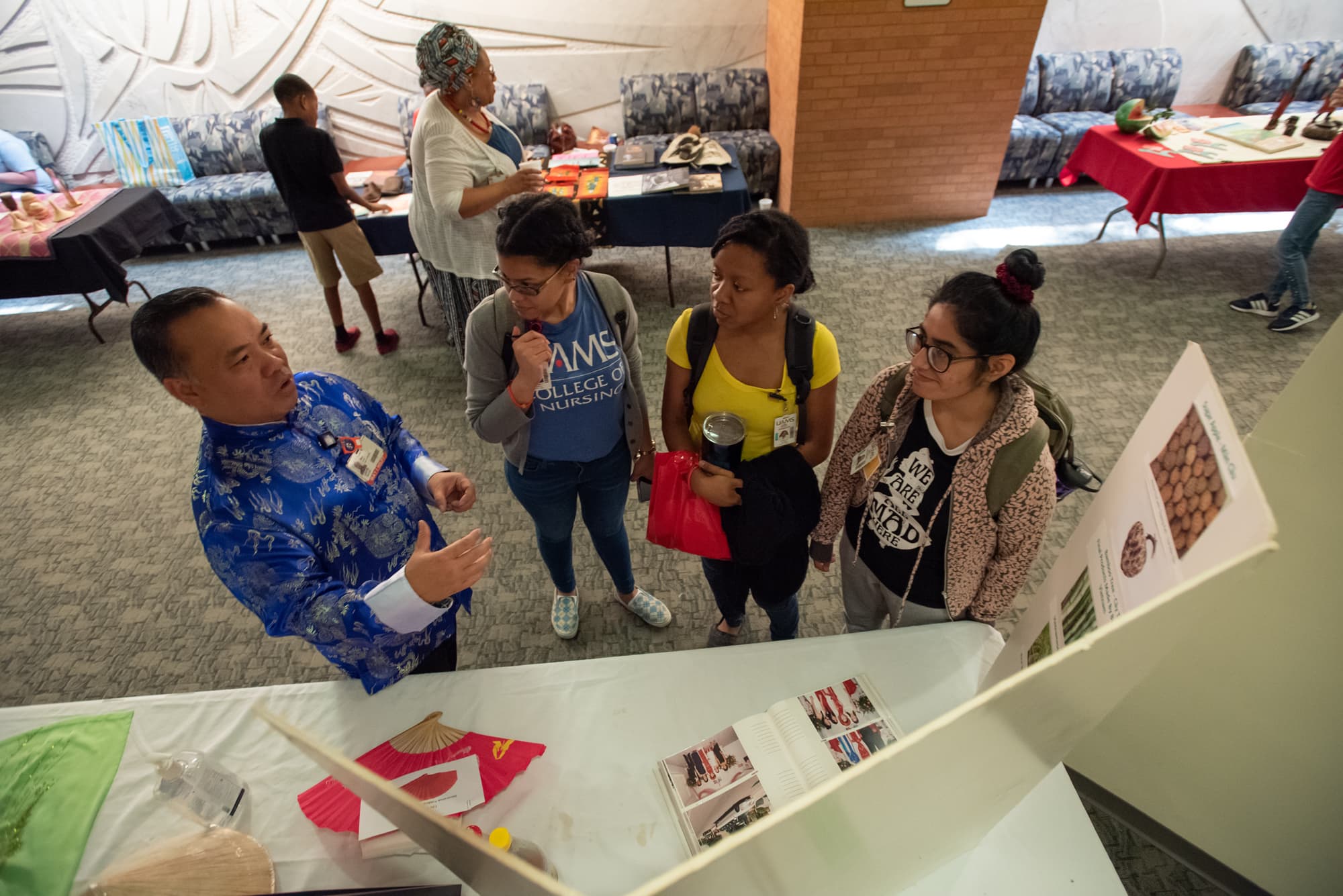View Larger Image

Toan Bui (left) shares information about Vietnam during the 2019 International Fest. Bui served as the moderator for this year's virtual panel discussion.
Image by Bryan Clifton
Speakers at International Fest Share Cultural Experiences
| Students and employees from the University of Arkansas for Medical Sciences (UAMS) heard a panel of speakers share details about their home countries and cultures during this year’s International Fest.
Planned by the Division for Diversity, Equity and Inclusion’s (DDEI) Diversity and Inclusion Engagement subcommittee, DDEI and the UAMS Graduate School co-sponsored the event.
Toan Bui, M.Ed., a curriculum development specialist in Clinical Nursing Informatics and the Clinical Education Department, moderated the Sept. 30 event and talked about his experiences before and after arriving in the United States from Vietnam.
Bui said he was brought to the U.S. in 1994 by his father, a former South Vietnamese soldier who fought alongside American troops during the Vietnam War. The family came here under the Humanitarian Operations program, a relocation effort for former Vietnamese political prisoners and their dependents.
Bui’s father was captured after the war and spent more than seven years in Vietnamese prisons. During that time, Bui and his two siblings were raised by their mother.
Bui said one of the most important aspects of the Vietnamese culture is the commitment to its elders. “The older you are in Vietnam, the more respect you command,” he said.
But generational differences have led to issues that will need to be addressed, Bui said. Vietnamese elders speak little or no English, creating a communications gap between them and the younger generations, he said.
The next speaker was Bunma Tan, a graduate student in the UAMS Fay W. Boozman College of Public Health. Tan came to the U.S. from Cambodia in 2018. He graduated in 2020 from Webster University in Orlando, Fla., with master’s degrees in business and finance.
Tan said his hard work is inspired by his parents. “They’re the ones who gave me reasons to be here,” he said.
He told of Cambodia’s 1975-79 war and genocide, a period that he described as “the sour part” of the nation’s history. Nearly four years of conflict resulted in the deaths of 3 million people, about half of Cambodia’s population at the time.
But Cambodia is more than just its past, Tan said. The country has a rich history of arts, culture and food, and it contains thousands of religious temples that serve as a particular point of pride. It also has a tourism industry that blends beautiful beaches and scenery with historic architecture.
“We’re still not there yet, we’re still a developing country, but I’m very proud to say that I’m from Cambodia because it’s a beautiful country,” he said.
Samjhana Shakya, a Ph.D. Candidate at the College of Public Health in the Department of Health Behavior and Health Education, spoke next about her experiences after moving to the U.S. from Nepal.
Shakya said her home country has more than 125 ethnic groups that live together in harmony. “Being born and raised in Nepal, I consider myself really blessed to have that exposure to different cultures,” she said.
Shakya came to the U.S. on a Fulbright Scholarship in 2014. After earning a master’s degree from the University of Kentucky, she came to UAMS in 2016. The COVID-19 pandemic has slowed the process of gaining her doctorate degree, but she said she hopes to complete it next year.
Citing Nepal’s patriarchal culture, Shakya said her time in the U.S. has given her opportunities to decide what she wants for her life. “It made me kind of fearless,” she said.
“Now I consider myself a global citizen,” Shakya said. “I feel like I’m one of you, and it’s so beautiful.”
Horacio Gomez-Acevedo, Ph.D., associate professor and graduate program director for the Department of Biomedical Informatics in the UAMS College of Medicine, was born in Mexico and studied in Canada before coming to the U.S.
Gomez-Acevedo noted the misconceptions that many people have about Mexican customs. Mexicans dress in the same way as Americans, he said, adding that the only time he’s worn a sombrero was in a school play when he was 8 years old.
“When I see people come into the U.S. from Mexico wearing those sombreros, I wonder where they got them,” he said.
Gomez-Acevedo lived in Mississippi when he came to the U.S., and he said he saw the racial differences that separate Americans. “I experienced firsthand how a street can divide one group of people from another, and it really breaks my heart,” he said.
“I feel that we are part of this global community, and something that we cannot control is our color of skin, our complexion, where we come from,” Gomez-Acevedo said. “I’m very passionate about this idea of trying to close the gap in this inequality.”
Gomez-Acevedo expressed optimism about the opportunities to close that gap. “This country is great at so many things,” he said. “There are things where, by working together, I think we can make this an even better place to live.”
The virtual International Fest marked the end of DDEI’s Diversity and Inclusion Month. Other events throughout September focused on diversity efforts at UAMS and the social factors that lead to health disparities.